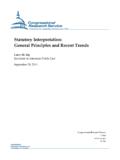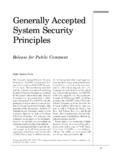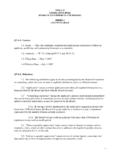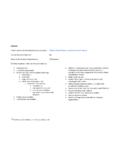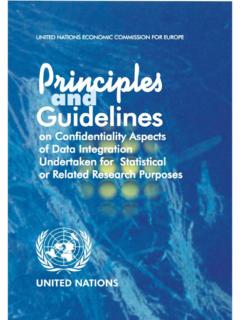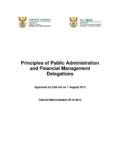Transcription of IN TERMS OF LEGISLATIVE DECREE NO 231, …
1 Organisation, management and control model in TERMS of Leg. Dec. 231/2001 ORGANISATION, MANAGEMENT AND CONTROL MODEL IN TERMS OF LEGISLATIVE DECREE NO. 231, dated 8 JUNE 2001 LEGISLATIVE DECREE No. 231, dated 8 June 2001, (hereinafter referred to as The DECREE ), containing the Regulations governing the administrative responsibility of corporate bodies, companies and associations with or without legal liability (hereinafter referred to as The Bodies ), introduces into the Italian regulations a special burden of responsibility on the companies themselves for a range of crimes committed in the company s interest or to its advantage: (i) by any natural person responsible for any representation, administrative or management functions within the company or any organisational unit thereof with financial and functional autonomy, as well as any natural person that officially or unofficially exercises management and control over said company or unit (or so-called individuals in senior positions ).
2 (ii) by any natural person subject to oversight or supervision by one of the aforesaid individuals (or so-called subordinates ). Previously the list of crimes for which the Body s administrative responsibility was contemplated (or so-called supposed crimes ) included the following: - crimes against the Public Administration - computer crimes and unauthorised handling of information; - crimes involving currency fraud, public paper and official stamps; - corporate crimes; - crimes committed for the purposes of terrorism or undermining law and order; - practices involving female genital mutilation; - crimes against the individual s character; - offences involving the abuse of confidential information and market manipulation; - culpable homicide and serious or life-threatening injury resulting from any violation of workplace health and safety regulations; - receiving of stolen goods, money laundering and the utilisation of illegally obtained money, goods or other criminal proceeds.
3 - cross-border crimes. Articles 6 and 7 of the DECREE stipulate that the Body shall not be held liable for the crime in the case where it is able to prove that it had in fact adopted and effectively implemented an organizational, management and control model that is capable of preventing the commission of crimes such as the one that in fact occurred , prior to the commission of the crime in question. In line with the provisions of the DECREE , Ambienta Sgr (hereinafter referred to as SGR or The Company ) has adopted an specific organisational, management and control model (hereinafter referred to as The Model ) in the belief that such action would be a valuable aid in sensitising Company employees as well as any other interested parties (such as customers, suppliers, partners and various other collaborators), such that Organisation, management and control model in TERMS of Leg.
4 Dec. 231/2001 they behave properly and appropriately while performing their duties in order to eliminate the possibility of the commission of any of the crimes contemplated by the DECREE . In adopting the aforesaid Model, the Company carefully examined all of its existing business activities and its organisational structures with the aim of identifying any company processes that were potentially exposed to the commission of any of the crimes indicated in the DECREE and, consequently, to identify the crime risk inherent in the various business sectors. The objective of the Model is to establish a structured and organic prevention and control system aimed at reducing the risk of any crime being committed within the scope of the Company s operations, with particular emphasis being placed on the prevention/elimination of any illegal activities. The Company sees the following as being the most important elements of the aforesaid precautionary control system: - a code of ethics aimed at establishing the commitments and ethical responsibilities involved in doing deals and conducting company business, as well as the combination of values and principles and the behavioural guidelines applicable to Company managers, employees and collaborators.
5 - the formalisation of the organisational system and the Company procedures so as to regulate the methods and the timing for conducting business activities, as well as ensuring the objectivity of the decision-making processes and clearly identifying the roles and responsibilities assigned to the different operational areas, by expressly outlining authority limits and signatory powers in accordance with the duties assigned and the position held within the company s organizational structure. In order to ensure effective implementation, the Company is continuously training and communicating with its employees with regard to the principles and the rules contained in the Model and has therefore provided for the introduction of an appropriate disciplinary system to deal with any failure to comply with these rules. In TERMS of the provisions of the DECREE ( , clause 1, letter b), the responsibility for ensuring the proper operation, efficiency of, and compliance with the Model s provisions, as well as for ensuring its regular and timeous updating, lies with a specific grouping within the Body , equipped with independent decision-making and control powers (hereinafter referred to as The Review Committee ).
6 The Company has set up a Review Committee made up as follows: a) Two independent professionals with a proven legal, organisational, accounting and risk assessment background, one of whom shall act as Committee Chairman; b) a member of the Audit Committee c) one Manager, whose task will be to assist and support the activities of the Review Committee but who will not have any vote The Company s Review Committee shall be responsible for monitoring the following: a) the efficiency and effectiveness of the Model in relation to the company structure and the Model s actual ability to prevent the commission of any of the crimes specified in the DECREE ; b) the applicable individuals compliance with the rules of the Model; c) whether there is any need for the updating and/or integration of the Model as a result of Company or LEGISLATIVE changes or as a result of possible proven violations. Modello di organizzazione, gestione e controllo ai sensi del 231/2001 MODELLO DI ORGANIZZAZIONE, GESTIONE E CONTROLLO AI SENSI DEL DECRETO LEGISLATIVO 8 GIUGNO 2001, N.
7 231 Il decreto legislativo 8 giugno 2001, n. 231 (di seguito, il Decreto ), recante la Disciplina della responsabilit amministrativa delle persone giuridiche, delle societ e delle associazioni anche prive di personalit giuridica (nel seguito, gli Enti ), introduce nell ordinamento italiano un peculiare regime di responsabilit a carico delle societ per una serie di reati commessi, nell interesse o vantaggio delle stesse: (i) da persone fisiche che rivestano funzioni di rappresentanza, di amministrazione o di direzione della societ o di una sua unit organizzativa dotata di autonomia finanziaria e funzionale, nonch da persone fisiche che esercitino, anche di fatto, la gestione e il controllo della medesima ( soggetti in posizione apicale ); (ii) da persone fisiche soggette alla direzione o alla vigilanza di uno dei soggetti sopra indicati ( soggetti sottoposti ). Ad oggi il catalogo dei reati in relazione ai quali prevista la responsabilit amministrativa dell Ente ( reati presupposto ), comprende: - reati contro la Pubblica Amministrazione - delitti informatici e trattamento illecito dei dati; - delitti in materia di falsit in monete, in carte di pubblico credito e in valori di bollo; - reati societari; - delitti con finalit di terrorismo o di eversione dell ordine democratico; - pratiche di mutilazione degli organi genitali femminili; - delitti contro la personalit individuale; - reati di abuso di informazioni privilegiate e di manipolazione del mercato; - omicidio colposo o lesioni gravi o gravissime commesse con violazione delle norme sulla tutela della salute e sicurezza sul lavoro; - ricettazione, riciclaggio e impiego di denaro, beni o utilit di provenienza illecita; - reati transnazionali.
8 Gli artt. 6 e 7 del Decreto prevedono che l Ente non risponda dell illecito nel caso in cui dimostri di aver adottato ed efficacemente attuato, prima della commissione del fatto, un modello di organizzazione, gestione e controllo idoneo a prevenire reati della specie di quello verificatosi . Ambienta (di seguito, Ambienta o la Societ ), in linea con le prescrizioni del Decreto, si dotata di un modello di organizzazione, gestione e controllo (di seguito, il Modello ), nella convinzione che tale iniziativa possa costituire un valido strumento di sensibilizzazione nei confronti di tutti i dipendenti della Societ e di tutti gli altri soggetti alla medesima cointeressati (clienti, fornitori, partners, collaboratori a diverso titolo), affinch gli stessi, nell espletamento delle proprie attivit , adottino comportamenti corretti e lineari, tali da prevenire il rischio di commissione dei reati contemplati nel Decreto.
9 Ai fini dell adozione del Modello, la Societ ha provveduto ad effettuare un accurata verifica delle attivit poste in essere, nonch delle proprie strutture organizzative, volte ad Modello di organizzazione, gestione e controllo ai sensi del 231/2001 identificare i processi societari sensibili alla realizzazione degli illeciti indicati nel Decreto e, conseguentemente, individuare i rischi reato ravvisabili nei diversi settori di attivit . Il Modello si propone di definire un sistema strutturato ed organico di prevenzione e controllo, finalizzato alla riduzione del rischio di commissione dei reati connessi all attivit aziendale, con particolare riguardo alla prevenzione/contrasto di eventuali comportamenti illeciti. La Societ individua le componenti pi rilevanti di tale sistema di controllo preventivo nelle seguenti: - codice etico, finalizzato ad esprimere gli impegni, le responsabilit etiche nella conduzione degli affari e delle attivit aziendali, l insieme dei valori e dei principi, nonch le linee di comportamento cui devono attenersi amministratori, dipendenti e collaboratori della Societ.
10 - formalizzazione del sistema organizzativo e delle procedure aziendali, finalizzata a disciplinare modalit e tempistiche di svolgimento delle attivit , garantire l oggettivazione dei processi decisionali e a definire con chiarezza compiti e responsabilit assegnati alle singole aree operative, attraverso l espressa indicazione dei limiti di esercizio dei poteri autorizzativi e di firma, in coerenza con le mansioni attribuite e le posizioni ricoperte nell ambito della struttura organizzativa. Al fine di garantirne l efficace attuazione, la Societ svolge un attivit di costante comunicazione e formazione dei propri dipendenti in ordine ai principi e alle prescrizioni contenuti nel Modello e ha previsto un adeguato sistema disciplinare, idoneo a sanzionare il mancato rispetto di tali disposizioni. Il compito di vigilare sul funzionamento, l efficacia e l osservanza del Modello, nonch di curarne il costante e tempestivo aggiornamento affidato, ai sensi del Decreto (art.)


